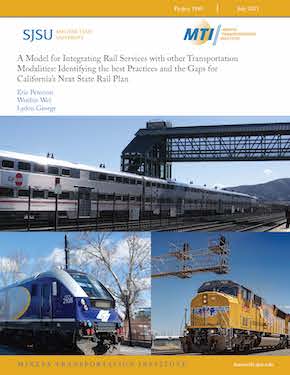- 408-924-7560
- mineta-institute@sjsu.edu
- Donate
A Model for Integrating Rail Services with other Transportation Modalities: Identifying the Best Practices and the Gaps for California’s Next State Rail Plan
The California State Rail Plan (CSRP) is among the best rail plan documents published by any jurisdiction in the United States to date. As such, the CSRP is used in this paper as the basis of comparison to other state rail service plans. These plans will have been submitted to the Federal Railroad Administration (FRA) on record as of June 2020—as required under Section 303 of the Passenger Rail Investment and Improvement Act (PRIIA) of 2008. The purpose of this paper is to identify the best practices and gaps that may inform California and other states in their future rail service plan development.
This paper is grounded in the realization that, while the general outline of FRA requirements is uniform for all states, the actual content and inclusion of these requirements in the myriad state plans varies greatly. For example, California was granted an exception to help update FRA Rail Plan Guidance for its 2018 Rail Plan, other states have complained that FRA guidance and requirements on rail service planning have put state rail agencies in the position of constantly writing plans with little or no time to implement them.
Throughout this research, the authors identify all the elements of FRA guidelines as reflected in the CSRP and rail plans of other states. This report also identifies the best features and planning strategies that may inform and improve the state rail planning process going forward, steps that will positively contribute to the public benefit of enhanced rail systems.
“CalSTA appreciates MTI’s thorough report that highlights the groundbreaking quality of California’s 2018 State Rail Plan and offers helpful suggestions for future improvements. With $30 billion of rail and connecting transit projects underway that are helping to advance the state rail plan, we look forward to even more projects in partnership with local, federal and private sector partners.” - Secretary David S. Kim, CalSTA
ERIC C. PETERSON
Eric C. Peterson is a transportation policy advisor. He is currently addressing infrastructure funding and finance, public transportation, and intercity and high-speed passenger rail issues.
In his career, he has played key roles in many major transportation improvement initiatives in the Washington, D.C. Metropolitan area. Peterson has also held significant leadership roles on Capitol Hill with national and regional transportation associations. Additionally, he was the first Deputy Administrator of the Research and Innovative Technology Administration in the U.S. Department of Transportation.
Outside of his transportation engagements, Eric Peterson is a former Deputy Under Secretary for Travel and Tourism at the U.S. Department of Commerce. He was also a former Executive Director of the U.S. Consumer Product Safety Commission. Peterson also served for many years on the Arlington County, Virginia Economic Development Commission where he was Chairman of its Tourism Committee.
As an active member of the Transportation Research Board Intercity and High-Speed Rail Committee (AR010) and the American Public Transportation Association’s Intercity and High-Speed Passenger Rail Committee, Peterson earned his undergraduate degree in Political Science from Nebraska Wesleyan University. He went on to earn his Master’s degree from the School of Public Communication at Boston University. Finally, he is a research associate with the Mineta Transportation Institute at San José State University, is associated with the George Washington University Institute for Corporate Responsibility, and is a member of the Board of Regents of the Eno Center for Transportation.
WENBIN WEI
Dr. Wenbin Wei is a Professor in the Department of Aviation and Technology at the College of Engineering at San José State University. He is also an Affiliated Professor in the Department of Industrial and System Engineering as well as Director of the Human Automation Integration Lab (HAIL) at San José State University. He has a Ph.D. from the University of California, Berkeley in Transportation Engineering and Management.
Before joining the faculty at San José State University, Dr. Wei was a research analyst in the Department of Operation Research and Decision Support at American Airlines. Dr. Wei’s research interests include: transportation planning; traffic control and management; multimodal transportation systems; rail and high-speed rail (HSR) transportation; airport and airline management; unmanned aerial vehicle (UAV); logistics; and supply chain management.
Dr. Wei has obtained more than $2 million for research grants from agencies such as FAA, NASA, and the California Department of Transportation. Dr. Wei has published more than 40 research papers in peer-reviewed journals in his field.
LYDON M. GEORGE
Lydon George is an aspiring urban planner and researcher. His focus lies in public and active transportation systems, racial and social equity in planning, and cultural enrichment in planning. He is a current graduate student in the Master of Urban Planning program at San José State University. George earned his B.A. in Economics with a minor in Sociology from the University of California, Santa Cruz.
George is currently providing research assistance to the Mineta Transportation Institute through the SJSU Research Foundation and has worked as an intern in the Transportation Planning Department at the Santa Clara Valley Transportation Authority. Here, he supports staff with transit research, GIS analysis, community outreach, and fieldwork.
-
Contact Us
San José State University One Washington Square, San Jose, CA 95192 Phone: 408-924-7560 Email: mineta-institute@sjsu.edu






